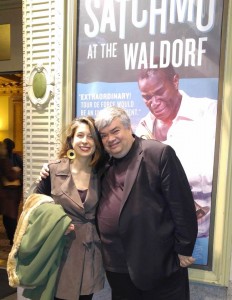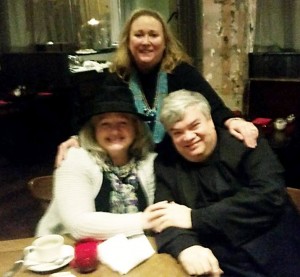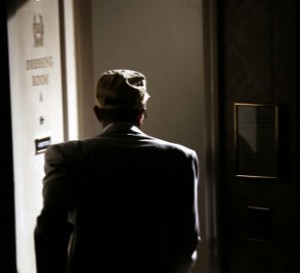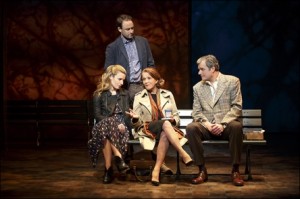 “She could never rid herself of the sense that unhappiness was a state of disease—of suffering as opposed to doing. To ‘do’—it hardly mattered what—would therefore be an escape, perhaps in some degree a remedy.”
“She could never rid herself of the sense that unhappiness was a state of disease—of suffering as opposed to doing. To ‘do’—it hardly mattered what—would therefore be an escape, perhaps in some degree a remedy.”
Henry James, The Portrait of a Lady
Terry Teachout on the arts in New York City
 Chicago’s Court Theatre announced yesterday that its critically acclaimed production of Satchmo at the Waldorf, my first play, will extend its run through February 14 “due to overwhelming demand.”
Chicago’s Court Theatre announced yesterday that its critically acclaimed production of Satchmo at the Waldorf, my first play, will extend its run through February 14 “due to overwhelming demand.”
Just in case you’re wondering, I’m delighted. Astonished. Flabbergasted. Discombobulated. All these things—and many, many more.
To order tickets or for more information about the play and production, go here.
* * *
Barry Shabaka Henley, the star of the Court Theatre’s production of Satchmo at the Waldorf, appears in two excerpts from the show.
As Louis Armstrong:
As Joe Glaser, Armstrong’s manager:
The age of mechanical reproduction, alas, has sharply diminished the value of the eyewitness account: I saw Count Basie in concert a half-dozen times when I lived in Kansas City, for instance, but I also saw him on film and TV so many times that it’s hard for me to distinguish between my first- and second-hand memories. Still, I’ve seen plenty of amazing things at which no cameramen were present….
Read the whole thing here.
 “A man who waits to believe in action before acting is anything you like, but he’s not a man of action. It is as if a tennis player before returning a ball stopped to think about his views of the physical and mental advantages of tennis. You must act as you breathe.”
“A man who waits to believe in action before acting is anything you like, but he’s not a man of action. It is as if a tennis player before returning a ball stopped to think about his views of the physical and mental advantages of tennis. You must act as you breathe.”
Georges Clemenceau, Clemenceau, The Events of His Life as Told by Himself to His Former Secretary, Jean Martet (trans. Milton Waldman)
 Satchmo at the Waldorf opened in San Francisco last Wednesday. I flew back to Florida’s Sanibel Island and my beloved Mrs. T early the next morning, having spent the preceding eleven days bouncing ceaselessly (if not altogether tirelessly) from coast to coast, opening Satchmo in Chicago and reviewing plays on Broadway.
Satchmo at the Waldorf opened in San Francisco last Wednesday. I flew back to Florida’s Sanibel Island and my beloved Mrs. T early the next morning, having spent the preceding eleven days bouncing ceaselessly (if not altogether tirelessly) from coast to coast, opening Satchmo in Chicago and reviewing plays on Broadway.
I’m not quite done with Satchmo. Mrs. T and I drove to Sarasota on Saturday to review two shows and spend two weeks on Longboat Key. Today, though, I’m flying up to Chicago for a one-nighter, an appearance at a symposium that is part of the Court Theatre’s ongoing Louis Armstrong Festival. But I’ll return to Sarasota first thing Tuesday, and once I’m there, I’m there: no rehearsals, no opening nights, no receptions. For now, I’m done with Satchmo.
John Patrick Shanley, the author of Doubt, is currently rehearsing a new play in New York. He tweeted something about it the other day that caught my eye: “Prodigal Son is taking off, leaving me in the dust. Soon it won’t need me anymore. For a playwright, this kind of abandonment is a victory.” I’m starting to know what he means. A third production of Satchmo at the Waldorf opened in New Hampshire last Friday, but I wasn’t there, just as I won’t be there when the San Francisco production transfers to Colorado Springs in February. Satchmo now belongs to Lawrence E. Street, Barry Shabaka Henley, John Douglas Thompson, and the theater companies that are currently producing it. For better or worse, my first play now has a life of its own. It doesn’t need me anymore.
 It feels strange to leave Satchmo behind, but it’s also something of a relief. Even when it goes well—perhaps especially when it goes well—opening a show out of town can be a lonely business. To be sure, I have old friends in Chicago and San Francisco who were kind enough to keep me company there, and I also love the wonderful new friends that I’ve made at American Conservatory Theater and the Court. Yet I missed Mrs. T fiercely during my long trek through the time zones, and by the time it was over, I was bone-tired of living out of a carry-on bag and never being quite sure when to go to bed.
It feels strange to leave Satchmo behind, but it’s also something of a relief. Even when it goes well—perhaps especially when it goes well—opening a show out of town can be a lonely business. To be sure, I have old friends in Chicago and San Francisco who were kind enough to keep me company there, and I also love the wonderful new friends that I’ve made at American Conservatory Theater and the Court. Yet I missed Mrs. T fiercely during my long trek through the time zones, and by the time it was over, I was bone-tired of living out of a carry-on bag and never being quite sure when to go to bed.
I guess I’m too old—and too happily married—to fully embrace the way of life about which Bruce Cockburn sings in “Life Short Call Now,” one of the saddest songs I know:
Billboards promise paradise
And tattoos “done while you wait”
Possible futures all laid out
On the sweeping curve of the interstate
Got no city, got no land
Got no lover, got no wife
How many ways to say goodbye
Can one man fit in a nomad life?
 Am I going to miss Satchmo at the Waldorf? I already do. How could I not? A playwright friend of mine accompanied me to opening night in San Francisco, and as I stood next to her at the party after the show, sipping champagne and thanking everybody in sight, I whispered in her ear, “I’m feeling a bit of post-partum depression.” She squeezed my hand sympathetically. I knew she knew how I felt. You become habituated to a steady flow of adrenalin when you’re rehearsing a play. Once it stops, the blues often set in—but they usually go away before long.
Am I going to miss Satchmo at the Waldorf? I already do. How could I not? A playwright friend of mine accompanied me to opening night in San Francisco, and as I stood next to her at the party after the show, sipping champagne and thanking everybody in sight, I whispered in her ear, “I’m feeling a bit of post-partum depression.” She squeezed my hand sympathetically. I knew she knew how I felt. You become habituated to a steady flow of adrenalin when you’re rehearsing a play. Once it stops, the blues often set in—but they usually go away before long.
Satchmo and I will be getting together again when I direct it for Palm Beach Dramaworks in May. Until then, I’ll be busy living my real life. It’s about time.
* * *
Bruce Cockburn sings “Life Short Call Now”:
 Baby Laurence does a tap-dance solo on an episode of The Hollywood Palace, originally telecast on ABC on September 26, 1967. This is one of the few surviving telecasts of Laurence’s dancing:
Baby Laurence does a tap-dance solo on an episode of The Hollywood Palace, originally telecast on ABC on September 26, 1967. This is one of the few surviving telecasts of Laurence’s dancing:
(This is the latest in a series of arts-related videos that appear in this space each Monday, Wednesday, and Friday.)
In today’s Wall Street Journal drama column I review the Broadway premiere of Richard Greenberg’s Our Mother’s Brief Affair. Here’s an excerpt.
* * *
I didn’t have high hopes for “Our Mother’s Brief Affair,” a four-hander about Anna (Linda Lavin), a woman on the brink of senility who confesses to Seth and Abby (Greg Keller and Kate Arrington), her gay twin children, that she once had an extra-marital affair with a man (John Procaccino) who wasn’t what, or whom, he seemed to be. That’s not an unpromising set-up, but to write about it in a superficial way is a recipe for mediocrity. Only Mr. Greenberg, to my surprise, has engaged with his material in an unequivocally personal way this time around: “Our Mother’s Brief Affair” is a memory play, a tale told to the audience by Seth, and it’s plain to see that Mr. Greenberg was plugged directly into the socket of his own psychic life when he wrote it. While the results are flawed, I was never bored by “Our Mother’s Brief Affair,” and some parts of it are quite moving.
 Ms. Lavin, the nominal star of the show, plays a physically attractive but “warm-cold” woman who has kept her children at arm’s length throughout her life. She is dissected by Seth in a stream of one-liners that have the sharp sting of well-remembered truth: “She had a tendency to pose…She was nostalgic but not for anything that had ever happened…She said five or six witty things, then repeated them.” The painfully inhibited Seth, who is enraged by Anna’s “decades of benign neglect,” is an even more striking character. A failed violist turned (unwillingly) celibate obituary writer, he is as disappointed with himself as Anna is disappointed with him: ”I’m…limited. One runs out of me quickly.” “Our Mother’s Brief Affair” gets all these things right, and the fact that Seth is a writer by trade justifies his quick-draw quippery. You buy him as a person—and you feel for him.
Ms. Lavin, the nominal star of the show, plays a physically attractive but “warm-cold” woman who has kept her children at arm’s length throughout her life. She is dissected by Seth in a stream of one-liners that have the sharp sting of well-remembered truth: “She had a tendency to pose…She was nostalgic but not for anything that had ever happened…She said five or six witty things, then repeated them.” The painfully inhibited Seth, who is enraged by Anna’s “decades of benign neglect,” is an even more striking character. A failed violist turned (unwillingly) celibate obituary writer, he is as disappointed with himself as Anna is disappointed with him: ”I’m…limited. One runs out of me quickly.” “Our Mother’s Brief Affair” gets all these things right, and the fact that Seth is a writer by trade justifies his quick-draw quippery. You buy him as a person—and you feel for him.
Unfortunately, “Our Mother’s Brief Affair” slithers off the track at midpoint…
* * *
Read the whole thing here.
A video featurette about Our Mother’s Brief Affair:
An ArtsJournal Blog